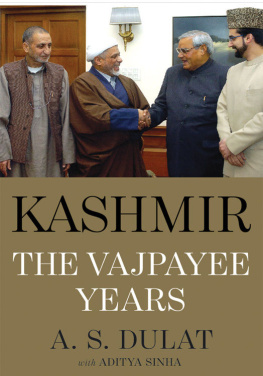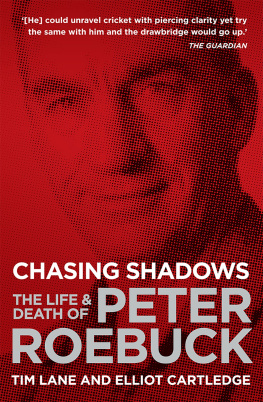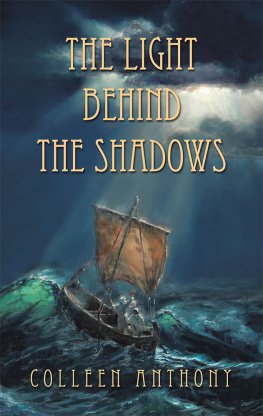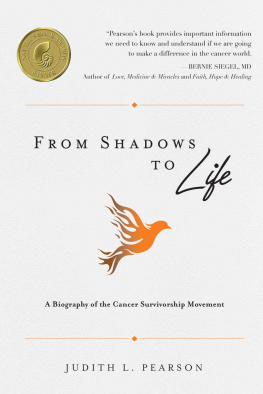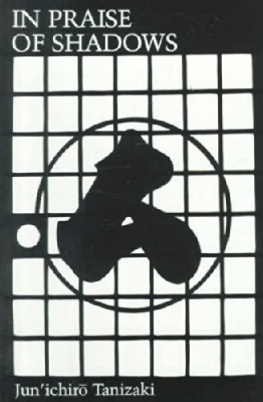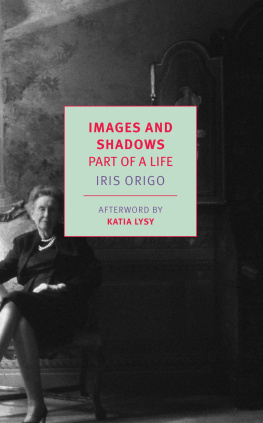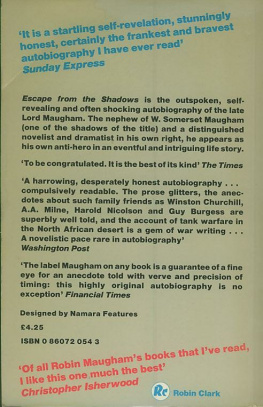A.S. Dulat - A Life in the Shadows
Here you can read online A.S. Dulat - A Life in the Shadows full text of the book (entire story) in english for free. Download pdf and epub, get meaning, cover and reviews about this ebook. year: 2022, publisher: HarperCollins India, genre: Home and family. Description of the work, (preface) as well as reviews are available. Best literature library LitArk.com created for fans of good reading and offers a wide selection of genres:
Romance novel
Science fiction
Adventure
Detective
Science
History
Home and family
Prose
Art
Politics
Computer
Non-fiction
Religion
Business
Children
Humor
Choose a favorite category and find really read worthwhile books. Enjoy immersion in the world of imagination, feel the emotions of the characters or learn something new for yourself, make an fascinating discovery.

- Book:A Life in the Shadows
- Author:
- Publisher:HarperCollins India
- Genre:
- Year:2022
- Rating:3 / 5
- Favourites:Add to favourites
- Your mark:
- 60
- 1
- 2
- 3
- 4
- 5
A Life in the Shadows: summary, description and annotation
We offer to read an annotation, description, summary or preface (depends on what the author of the book "A Life in the Shadows" wrote himself). If you haven't found the necessary information about the book — write in the comments, we will try to find it.
A Life in the Shadows — read online for free the complete book (whole text) full work
Below is the text of the book, divided by pages. System saving the place of the last page read, allows you to conveniently read the book "A Life in the Shadows" online for free, without having to search again every time where you left off. Put a bookmark, and you can go to the page where you finished reading at any time.
Font size:
Interval:
Bookmark:
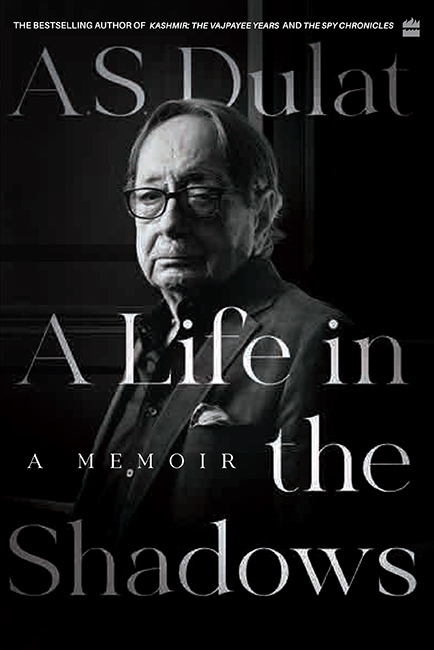

To the intelligence services, whose heroes remain unknown and unsung
I am my own messenger.
So, ask my heart
No pen, no message will carry my tale.
Rasul Mir, nineteenth-century Kashmiri poet
Contents
W HERE DID IT ALL BEGIN?
Thats the question Ive been asking myself while writing this book. Each time I think of this question, it leaves me with a different answer. I was never a compulsive diarist or journal-keeper, so really, I dont have much beyond my memory to tell you where it might have begun. Life doesnt wait for you to fill the pages sometimes. But what I can do is give you some of the answers I found while I was putting this book together.
For me, then, it all began in Chandigarh. It is a city that is tied up, for me, in all kinds of emotions, and in many ways, it is home. For my family, however, it began far awayin terms of both geography and time.
The Dulat familys history is one that is shrouded in the mists of the past. The closest that I have been able to uncover is a charming little story told by a brilliant administrator and historian of colonial Punjab, Sir Lepel Griffin, KCSI. According to Griffin, our family belongs to a good-looking Rajput clan from Bikaner, the men of which wore their hair long and in two plaits. Two plaits, in the vernacular, means do lattand from there, we have Dulat. Is this true? Who can saybut it makes for quite a nice little anecdote. From Bikaner, my family shiftedI cant tell you whento Longowal, and thence to Nabha. That is why anyone from my family will tell you, should you ask, that they belong to Nabha. But the trajectory really began from Bikaner, many, many years ago.
My grandfather, Gurdial Singh Dulat, served the court of Nabha for some years. In the early 1920s, the Maharaja of Nabha, Ripudaman Singh, and the Maharaja of Patiala fell out on some issue or other which is lost to history. The Government of India appointed Sir Louis Stuart as the commissioner to inquire into the quarrel. Sir Louis submitted a report sometime in April 1923, according to which the Maharaja of Nabha was removed from Nabha, and came to live in Dehra Dun. He was, however, allowed to retain his title and the privileges of a privy purse and a gun salute. Later, even that would be snatched away from Ripudaman Singh, and he would be deported toof all placesKodaikanal. Meanwhile, the regency of Nabha was handed to the minor son of the erstwhile maharaja. The administration of the state was placed under an administrator and an assistant administrator, with a Council of Regency keeping watch. Why do I tell you this story? Because the assistant administrator in question was my grandfather, Sardar Bahadur Gurdial Singh Dulat. In our family, he was always referred to as the Home Minister of Nabha, for that was what the duties of his post entailed.
I dont remember much about old Gurdial Singh, or, indeed, about my maternal grandfather, Shiv Ram Sawhney (in the family, he was called Shyam). But I do know they were good men, large-hearted and kind, and they got along excellently. Sawhney was a barrister, who joined Sir Sikander Hayat Khans Unionist Party, but sadly, just like Sir Sikander, who died in 1942, both my grandfathers also passed away before the partition of India took place. Still, while he was alive, the Sawhney home on Temple Road and, subsequently, at 4 Zafar Ali Road, Lahore, was said to be an open, welcoming house. Gurdial Singh must have been an open-minded person too, because he sent his son, Shamsher (my father), abroad to the University of Cambridge. Young Shamsher grew up in Lahore, in an atmosphere that was clearly conducive to the ideas of government and administrative service. He finished both his schoolingfrom DAV Schooland his collegefrom Government Collegein Lahore, before he set off overseas.
His relationship with Gurdialas was the wont of those dayswas fairly formal, particularly since he grew up without a mother. Gurdials first wife, Shamshers mother, died fairly young, and the boy was brought up by Gurdials sister. This is where it gets interesting, because when I was older, I discovered that the Dulat family is also connected to the Patiala family. My fathers first cousin, Jaswant Kaur, was married to Maharaja Bhupendra Singh. She was the second of his wives, known formally as Maharani Jaswant Kaur of Rare. Here, I must digress just a little to tell you an even more interesting connection. Jaswant Kaurs half-brother and fathers cousin as well, Sardar Gian Singh Rarewala, was the first chief minister of the Patiala and East Punjab States Union (PEPSU) in 1948, where he continued until he joined the government of Sardar Partap Singh Kairon in 1957.
Jaswant Kaurs son, Raja Bhalindra Singh (191992) grew up to become a first-class cricketer, a middle order batsman and a slow bowler (aside from being the Maharajkumar of Patiala). He, too, went abroad to studyat Magdalene College, in Cambridge University. Bhalindra played just one first class match in England, for Cambridge University in 1939, and much later, he became member of the International Olympic Committee (194792) and president of the Indian Olympic Association twice, from 1960 to 1975 and from 1980 to 1984. In 1982, Bhalindra was instrumental in organizing and bringing the Asian Games to India.
In fact, sports seems to have run through my family. Bhalindras son, Randhir, for instance, grew up to become an Olympic-level trap and skeet shooter. He was only about eighteen years old when he debuted as part of the winning trap shooting team at the Indian National Championships in 1964, and he went on to become, I am proud to say, the first Indian shooter to win a continental gold at the 1978 Asian Games in Bangkok. It would be the first of many accolades in the field. Today, Randhir is one of Indias most influential sports administrators, having won the Arjuna Award in 1979 and holds the post of the acting president of the Olympic Council of Asia (OCA). Small wonder, then, that cricketwhich I played until my career and my age intervenedhas been one of my abiding passions!
Of course, all these stories of Bhalindra and Randhir came much later. In the early days, as I was to discover, nobody paid that much attention to what was due to the family name or our faith. We were an irreligious, irreverent lot right from the start. My father grew up with the understanding that he would eventually train for the Indian Civil Service (ICS), and as part of his training, he was sent abroad to Kings College at the University of Cambridge, to take his Tripos in History. Those were days when upper-caste Indians of good families didnt really go overseas, unless they were of both means and privilege. Shamsher arrived in England sometime in 1924, and almost as soon as he arrived, not only did he cut off his long hair, but he lost no time in falling in love with an Englishwoman by the name of Eileen Margaret Lawrence. They were married in 1926. None of us ever met her. She passed away in childbirth, having given birth to my brother, Jugjeet Barnaby (yes, Barnaby!) Dulat, in 1928.
I have often wondered whether Sardar Bahadur Gurdial Singh Dulat minded what his son had done, because though Shamsher returned to India once his Tripos was done, Eileenby then pregnant with Jugjeetstayed behind in England. Jugjeet was brought up by suitable nannies and Eileens mother until he was seven years old. By this time, of course, my father had joined the ICS in Punjab. He was one of the eleven Sikh officers to be selected for the ICS, and one of the three officers who were nominated (the others had to unfortunately sit for the examinations!). My father was, in fact, doing very well for himself by the time Jugjeet came out to India. Shortly after he arrived, however, Shamsher felt the need to marry again. It was a late second marriage as it was, because there is a twelve-year gap between Jugjeet and me. He had seemed in no hurry to marry, but his second marriage proved to be a happy one. This was to a Hindu woman, my mother. In those days, there were many Sikh and Hindu inter-caste marriages, but in our family, there was no real talk of religion or caste. It didnt seem to matter to either my parents or to us later.
Font size:
Interval:
Bookmark:
Similar books «A Life in the Shadows»
Look at similar books to A Life in the Shadows. We have selected literature similar in name and meaning in the hope of providing readers with more options to find new, interesting, not yet read works.
Discussion, reviews of the book A Life in the Shadows and just readers' own opinions. Leave your comments, write what you think about the work, its meaning or the main characters. Specify what exactly you liked and what you didn't like, and why you think so.

